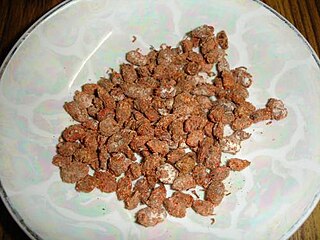
Unani or Yunani medicine is Perso-Arabic traditional medicine as practiced in Muslim culture in South Asia and modern day Central Asia. Unani medicine is pseudoscientific. The Indian Medical Association describes Unani practitioners who claim to practice medicine as quacks.

Bangalore Medical College and Research Institute (BMCRI), formerly Bangalore Medical College (BMC), is a medical college in Bengaluru, India run by the Government of Karnataka. It is on K.R. Road, near City Market. It is one of ten government medical colleges in Karnataka. BMCRI is an autonomous institution under the Rajiv Gandhi University of Health Sciences, Bengaluru.
The Ayurvedic and Unani Tibbia College, also popularly known as Tibbia College, is an institution under the Government of Delhi, located at Karol Bagh in New Delhi, India. The institution which offers education and training in Ayurvedic and Unani medicine, has its origins dating back to the late 19th century. The college, whose foundation was laid by Charles Hardinge, 1st Baron Hardinge of Penshurst on 29 March 1916, the then Viceroy of India and was inaugurated by the Father of the Nation, Mahatma Gandhi, on 13 February 1921, offers bachelor's and masters (MD) degrees in Ayurvedic and Unani streams.

Government Kilpauk Medical College (GKMC) is a government medical institution in Chennai, India. Founded in 1960, there are four hospitals attached to GKMC - Government Kilpauk Medical College Hospital. They are Government Royapettah Hospital, Government Thiruvotteeswarar Hospital of Thoracic Medicine, Government Peripheral Hospital, K.K.Nagar and Government Peripheral Hospital, Anna Nagar. The college is affiliated to The Tamil Nadu Dr. M.G.R. Medical University, Chennai. It offers a number of undergraduate and postgraduate programs.
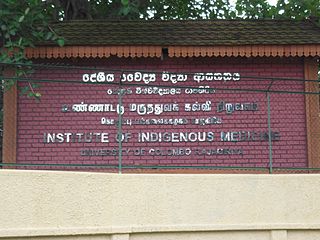
The Faculty of Indigenous Medicine of the University of Colombo, specialising in Ayurveda and the Sri Lankan traditional medicine. Founded as the College of Indigenous Medicine in 1929, it became part of the University of Colombo adopting its current name in 1977. It is a premier center of undergraduate and postgraduate study and research into Ayurveda and Indigenous Medicine and Healthcare.
The Government Unani and Ayurvedic Medical College and Hospital is a graduate, non-profit medical college, and associated hospital, located in Dhaka, Bangladesh. It was established on 10 March 1989.
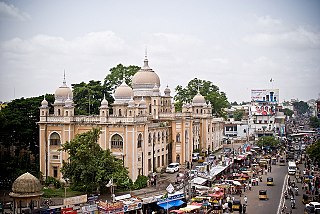
Government Nizamia General Hospital, popularly known as Government Unani Hospital, is a public hospital located in Hyderabad, Telangana, India. It is a hospital for general and Unani medicine. It was established during the reign of Nizams. It is located near the historic building of Charminar.

Government Nizamia Tibbi College is a unani medicine college located in Hyderabad, Telangana, India.
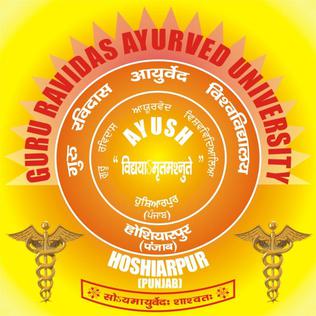
Guru Ravidas Ayurved University is a public university for Ayurveda, Yoga & Naturopathy, Unani, Siddha and Homeopathy located in Hoshiarpur, Punjab, India.
The National Council for Homeopathy (NCH) is an autonomous body constituted to regulate the education and registration of homeopathic medical practitioners in Pakistan.

Ghulam Muhammad Mahar Medical College or GMMMC in short is the sixth public sector Medical college under the Government of Sindh where 100 students of Sukkur, Khairpur and Ghotki are getting education every year. It is named after Sindh politician Ghulam Muhammad Khan Mahar.

Hakim Syed Khaleefathullah is an Indian physician and the founder of Niamath Science Academy, known for his scholarship and expertise in the alternative medicine system of Unani. He was honoured by the Government of India, in 2014, with the Padma Shri, the fourth highest Indian civilian award, for his contribution to the field of medicine.
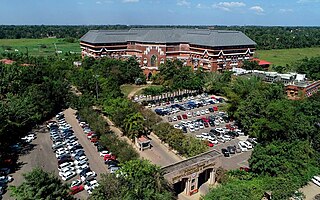
Believers Church Medical College Hospital (BCMCH) is a healthcare institution of Believers eastern Church based in Thiruvalla, Kerala, India. The Medical College is attached to a 750-bed, multi-speciality hospital. The Medical College, established in 2016, is situated in a campus of about 25 acres (10 ha) connected by rail and road.
Koppal Institute of Medical Sciences is a government medical college established in 2013 and is located in Koppal, Karnataka. The college accommodates 150 undergraduate MBBS seats and 47 postgraduate seats. The medical college and the medical courses are recognized by National Medical Commission.
Gulbarga Institute of Medical Sciences (GIMS) is a medical college located in Kalaburagi, Karnataka and run by the Government of Karnataka. The institution is affiliated to Rajiv Gandhi University of Health Sciences.
Basaveshwara Teaching and General Hospital, Gulbarga is a private hospital affiliated with Mahadevappa Rampure Medical College (MRMC) in Gulbarga, Karnataka state, India. It is a renowned hospital in the name of Basaveshwara.
Kharagpur Homoeopathic Medical College and Hospital, is a homeopathic medical college in Kharagpur, Paschim Medinipur district, West Bengal, India. The college is recognized by the Central Council of Homeopathy, New Delhi. This college is affiliated to the West Bengal University of Health Sciences. It offers the Bachelor of Homeopathic Medicine and Surgery (BHMS) degree course.
Hassan Institute of Medical Sciences is a medical college located in Hassan, Karnataka run by the Government of Karnataka. The institution affiliated to Rajiv Gandhi University of Health Sciences.
Government Tibbi College and Hospital, Patna, established in 1926, is an Unani medical college situated in Patna, Bihar, India.

The standard entry-to-practice degree in modern evidence-based medicine in India is the Bachelor of Medicine and Bachelor of Surgery (MBBS). Alternative systems of Medicine in India are Ayurveda (BAMS), Unani (BUMS), Siddha(BSMS), Homeopathy (BHMS). M.B.B.S. a credential earned upon completion of a five-and-a-half-year undergraduate program. The curriculum is divided into one year of preclinical studies in general science subjects and three and a half years of paraclinical and clinical studies, followed by a one-year clinical internship. Before beginning the internship, students are required to pass several examinations, the final one of which is conducted in two parts. Postgraduate education in medical specialties typically takes 3 additional years of study after the MBBS and concludes with the award of a Master of Surgery or Doctor of Medicine(MD). Postgraduate diplomas in medical specialities may also be awarded upon the completion of two-year training programs. After that a person can further get a degree in superspeciality in his or her respective branch after successful completion of 3 years of superspeciality in a medical college.










